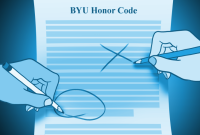Religion in Education

The U.S. Dept. of Education dismissed a sex discrimination complaint against BYU after the school dropped the prohibition of same-sex relationships from its Honor Code, but continued to ban them as a policy.

A downloadable resource by Theresa Lynn Sidebotham, Esq. about the challenging circumstances which public school teachers face when expressing their faith at work.
In re Episcopal School of Dallas is a recent Texas court case affirming a faith-based school’s right to manage its internal affairs according to its beliefs, including its discipline decisions.
Should a religious college be considered a public accommodation? A recent case from Pennsylvania says yes and also decides that no First Amendment defenses apply.
This post outlines a suit by a gay student against his Catholic high school and provides some practice pointers for religious schools on avoiding similar issues.
Religious schools have always had the right to decide whether students should have to keep a moral code as a condition of enrollment. A recent case out of Texas, In re St. Thomas High School, solidifies this right.
One challenge in figuring out what religious speech is permitted for students is that it depends on whether the school is trying to prevent the speech or allow it. A January 2013 Second Circuit case, A.M. v. Taconic Hills Central School District, gives some insight, though it is a summary order that is not precedential.
Must public education be free from all religion? Should parents who want Biblical education pay twice but - once, through taxes for public school, and again for a private school with their values? The Freedom From Religion Foundation staged another attack on a school released-time policy. The FFRF insists that the plan is “granting special treatment to attend select evangelical Christian education courses,” and that violates the Constitution.
